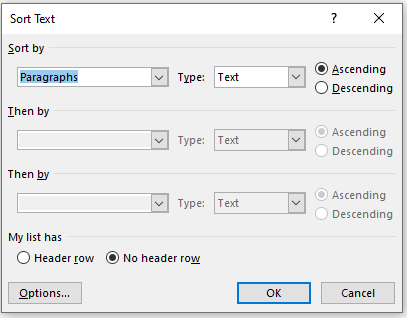- A list of references gives an overview of all sources which were used and cited in a paper.
- A bibliography, however, lists relevant sources that have not been cited as well.
- In both cases, references are sorted alphabetically by the authors’ last names.
What is a list of references and why is it necessary?
The list of all references is the part of your paper where you list all the sources cited. It contains complete information about each source. Some citation styles use abbreviated in-text references. The list of references is the place where readers will always find a full list including all important information. Sometimes, lecturers or departments also recommend adding literature that you read during your research but didn’t cite in the paper. This is called a bibliography.
What should a list of references look like?
In order to provide a good overview, a list of references is sorted alphabetically. As most citation styles put the authors’ last name at the beginning of a reference, the list of references is sorted alphabetically by last name. Most writing tools have a functionality for sorting text. Before you use it, make sure that each source in your list forms a separate, coherent paragraph. If this is the case, you can sort these paragraphs alphabetically. In Microsoft Word, this function can be found in the top navigation, “Home” > “Paragraph”:

A new window will open where you can choose whether you’d like to have an ascending or descending sorting. For your list of references, use an ascending sorting as a standard (A to Z).

Additionally, it might be helpful to subdivide the list of references into several sub-categories. Depending on your field of study, you may want to distinguish between primary and secondary literature. Alternatively, you can separate printed publications from online sources.
How to create a list of references with a referencing tool
Referencing tools like Citavi or EndNote can help you create a complete and uniform list of references. To use this feature, you need to connect your referencing tool to your writing program (e.g. Microsoft Word). You can then use this connection to add in-text citations to your text. Your referencing tool will automatically create a list of references at the end of your paper. Whenever you add a reference in the text, it will also add an entry in your list of references. Like this, you won’t miss any sources.
- Don’t forget to add a list of references.
- Don’t omit any sources.
- Don’t sort your list of references manually.
Test yourself: Do you know everything about the list of references?
What is a list of references?
- A complete list of sources cited in an academic or scientific paper
- A list of all relevant sources for my topic
- It’s another word for a list of figures
Solution:
A – A complete list of sources cited in an academic or scientific paper; only a bibliography also lists relevant sources which haven’t been cited
Why do you need a list of references in every academic or scientific paper?
- To prove that I wrote the paper myself
- To disclose all cited sources which is part of Good Scientific Practice
- To catalog all publications on a topic
Solution:
B – To disclose all cited sources which is part of Good Scientific Practice
How is a list of references sorted?
- In descending order according to the number of quotations
- By publication year
- Sorted alphabetically by the author’s last name
Solution:
C – Sorted alphabetically by the author’s last name
What is the easiest way to sort a list of references?
- To use the sorting feature in my writing program
- To do the sorting when I finished the rest of the paper
- To sort my references manually
Solution:
A – To use the sorting feature in my writing program
What does a referencing tool do?
- It suggests a citation style for my references
- It automatically creates a list of figures
- It automatically creates a list of references from my in-text citations
Solution:
C – It automatically creates a list of references from my in-text citations.
